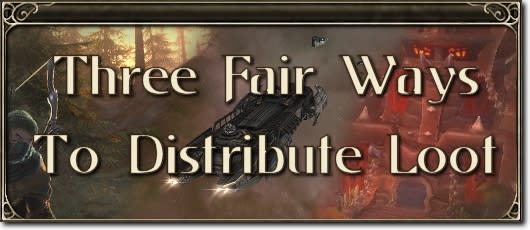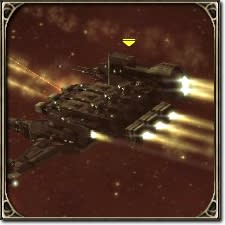MMO Mechanics: Three fair ways to distribute loot
I mentioned last week that players throw their precious characters into the MMO meat grinder in the pursuit of higher levels, new achievements, or shinier gear. We gladly jump on the seemingly endless PvE treadmill, cranking up the speed with each new patch in an attempt to catch the dangling carrot of character perfection. Of course, we don't just punish ourselves like this to say we overcame some previously impossible challenge; there's shiny new loot to be had! The best booty usually comes from completing group activities like dungeons and raids, but not everyone can agree on how to share the spoils of joint pursuits.
Several different loot distribution methods have been devised over the years to solve the problem of fairly distributing the swag, with most methods starting life as player-made agreements that weren't officially supported by hard-coded game mechanics. Players have long since rolled for gear or took turns to claim items round-robin style, leading developers to implement the most popular methods as actual game mechanics to avoid ninja-looting and then the inevitable public pity parties associated with player-led arbitration.
In this edition of MMO Mechanics, I'll break down three of the most equitable loot distribution systems used in MMOs today and look at why this age-old problem doesn't have a one-size-fits-all solution.
Need Before Greed
The Need Before Greed (NBG) system was originally a player-devised method of fairly distributing sought-after gear in older MMOs like EverQuest. Only players who genuinely need an item are allowed to roll for it under this ruleset, and if nobody actually needs the item, then it passes to a greed roll. At this point, anyone can roll on the item and toss it to the vendor for a few gold coins if successful. Whether someone actually needs an item is usually determined by the party leader or group consensus based on the gear's stats and the player's role within the party.
NBG is now mechanically implemented as a party option in virtually every major MMO, including my latest favourite Neverwinter, and with good reason: It's a fantastic way to fairly distribute loot in groups of relative strangers since trusting your fellow players is optional. You can casually join groups with people you don't know, relatively safe in the knowledge that your rightful reward won't end up in a pilferer's backpack. It goes without saying that NBG saves the poor customer service agents behind MMOs like World of Warcraft from dealing with quite as many angst-filled complaints about gear; Blizzard has a very clear policy on what constitutes ninja-looting and can justify this by mechanising distribution systems like NBG.
With the need for trust gone, reputation in the game community matters less, causing some players to cheat the system and get more than their fair shares. Even Blizzard, despite its pro-NBG stance, admits that loot scams can and do occur under the system. Players can swap out their good gear for weaker alternatives before joining a group or killing a boss in order to play the pauper, standing with their hat in their hands begging for a few scraps. Once the loot decision is mechanised, it falls to each individual player to select need or greed for themselves on vaguely appropriate gear, and some will inevitably take advantage of that responsibility.
EVE Online's honour system born from Free-For-All
Mechanically speaking, sci-fi MMO EVE Online has only a Free-For-All looting system. CCP has a policy of not adding mechanical safety nets to existing trust-based systems, since such interference would undermine the very premise of sandbox gameplay. This stance may seem to expose the EVE playerbase to ninja-looters and other manipulators, but theft is just par for the course in the wild wild west of New Eden. Wondrously, this unwritten code of honour actually manages to work extremely well without leading to as many thefts and arguments as you might imagine.
Forming groups in EVE isn't taken lightly, so such shows of trust are usually kept amongst friends so as to avoid taking needless risks. Developers have encouraged strangers to play nice with each other through faction warfare for PvP and incursions for PvE. PvE rewards usually line your pockets with plain currency that is automatically split among the group, but PvP is a different story. Anyone can snag loot from the wrecks of fallen allies or vanquished foes, but the fleet commander may expect you to aid your wounded comrades who have lost ships during the battle by handing over enough money or loot to offset the cost of their losses. Fleet leaders can enable loot logging to get a list of everyone who scavenged items from wrecks during the action, and those who abscond with it rarely get invited back to the same fleets.
The biggest disadvantage of a conduct-based system is that it simply won't work in every MMO; in fact, EVE seems to be one of the rare cases in which donating loot to whoever needs it the most actually works. All items in EVE are unbound and tradeable; all loot and ship losses can be boiled down to the financial cost to the aggrieved player, making it easy for looters to donate the items or ISK of equivalent value to those who need it. Since EVE is a single-shard sandbox, there's nowhere for opportunistic thieves to hide; without alternate instances or new servers to run to, such players would quickly gain a negative reputation throughout the game community.
The lack of hard mechanics to mediate item looting is almost a mechanic in itself as it's such a well thought-out and integral part of the trust metagame. If the honour system was mechanistically established, this trust would soon be arbitrated away by a heavy reliance on the game as a stoic mediator, and from there it's a slippery slope toward a frightening lack of grandiose scams coming from EVE Online!
Master Looter
Some MMOs abdicate responsibility for loot distribution to the players in a more controlled manner than EVE's free-for-all item-grab by providing a Master Looter option. One player in the party is designated as the master looter and then assumes responsibility for deciding who gets each item. Sometimes the master looter is the only one who can loot enemies and has to manually hand out items, but it's more common for the looter to select the intended recipient via a menu. This is how it's done in World of Warcraft and countless other titles, and it's really the only sensible way to allow raid leaders to safely assign loot that binds when picked up.
In the case of mistakenly assigning loot to the wrong person, most MMOs will allow players to trade soulbound gear with another member of the gear-accruing group for the next few hours. Master Looter affords groups the flexibility to come up with their own methods of doling out the goods without making the resulting systems official mechanics. People have come up with various point-based merit and demerit systems like Dragon King Points (DKP) and complex gold bidding systems in which you have to buy the gear and split the bid amount with the other players in the party. Points-based or gear-priority systems are favoured by some guilds over the classic Need Before Greed model because players can be rewarded for behaviours that benefit the collective, like good raid attendance, excellent performance, and punctuality.
Master Looter also means players have to agree on the proposed distribution technique in advance and must trust the assigned looter with the arbitration of that system. That's a huge red flag in public groups; there's nothing stopping the master looter from hightailing it out of the group with items that are rightfully yours, an unfortunate occurrence that's particularly painful if the dungeon or raid you're tackling has a lockout timer barring you from seeking that coveted upgrade again. Trying to impose a points-based loot priority system on complete strangers is virtually impossible and frequently leads to arguments that can make the whole group fall apart; this isn't exactly what I'd call a fun way to spend my raiding nights!
There are many different ways to divvy up the spoils of our shared adventures, and each comes packaged with its own trails and tribulations. Mechanised Need Before Greed naturally fits better with quickfire PUG scenarios as it diminishes the need for trust between partied players, while Master Looter appeals to raiders, groups of close acquaintances, and guilds, since it allows them to implement their own value systems or use their own priorities to distribute gear. The need for trust in a free-for-all system isn't necessarily a detriment in sandboxes and other MMOs with tight-knit communities simply because nobody wants to become known as a thief in such a closed system.
When loot distribution is officially mechanised, these systems have the potential to save us from spiraling arguments and downright unfairness, but there isn't an exact fit that works in all instances at all times. MMOs cater to a variety of different players and playstyles, and ultimately most MMOs will allow you to choose between all three looting systems, highlighting yet another way that the genre celebrates diversity.

MMOs are composed of many moving parts, but Massively's Tina Lauro is willing to risk industrial injury so that you can enjoy her mechanical musings. Her column, MMO Mechanics, explores the various workings behind our beloved MMOs every Wednesday.






